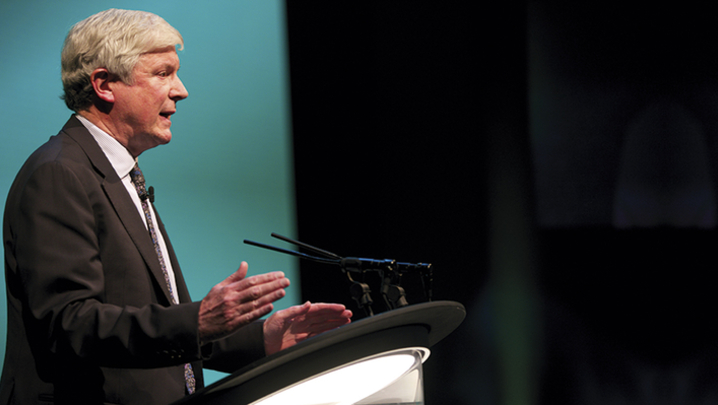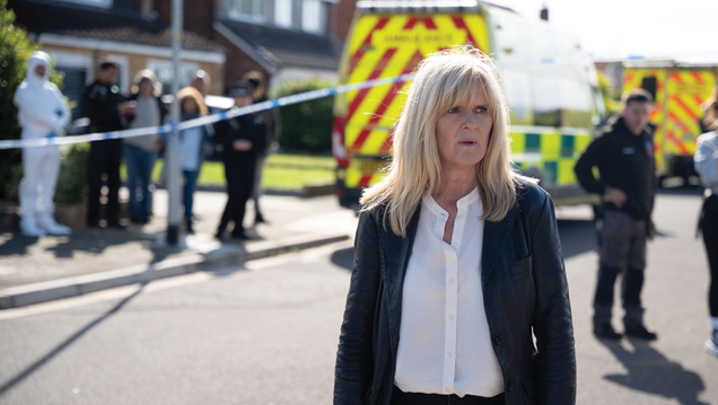Caroline Frost talks to ITV Head of Drama Polly Hill, whose career hit a new high with the success of Mr Bates vs the Post Office
“My dad always told me you can change the world with drama, particularly new writing, and I would reply: ‘You can’t.’”
Polly Hill speaks fondly of her father, the veteran actor Dave Hill, whose long list of stage, film and TV credits testifies to his half-century in the business, and who used to take his teenage daughter weekly to the theatre for inspiration. “Then Mr Bates came along. My dad’s nearly 80 now, and he took delight in saying: ‘See, I told you.’”
He wasn’t wrong. As ITV’s Head of Drama, Hill steered Mr Bates vs the Post Office to become one of the highest-rated and most powerful dramas of the decade. The series, including the documentary, was watched by more than 14.8 million people. The programme finally brought the scandal of the faulty Horizon software to the attention of the public and will reinforce demands to compensate the hundreds of sub-postmasters unjustly accused of theft – and punish those responsible.
“Mr Bates is one of the most incredible, emotional moments of my career,” Hill says, beaming. “What has been so moving is not just that it has created so much proper change, but also the response of everyone in this industry. People have emailed me to say: ‘We’re all so proud, and we stand with you.’”
“The power of drama is that it can put you in someone else’s shoes and tell this David and Goliath story of taking on powerful institutions. But you couldn’t have predicted it would be this huge. It has been a career highlight I am sure I will never see again.”
Hill has lived in a world of drama for as long as she can remember, hoovering up TV as a child and “just consuming stories”. She says she learned a lot more on those weekly theatre trips than she did studying for a drama degree, and realised she wanted to immerse herself in scripts, just not as a writer.
After knocking on doors, she got her first break as a script reader for the veteran producer Verity Lambert – “an amazing woman” – and soon became a script editor on EastEnders.
Hill credits writer Tony Jordan with showing her the value of dialogue and respecting her input even then on how young people really talk.
What was the biggest lesson from those days?
“My job is to commission shows I think the audience will want to watch and to ask the questions that I think will make a difference from the audience’s point of view.”
After brief stints at ITV and Channel 4 – “there was no plan, I was just going wherever the script editor jobs were taking me” – in 2005, Hill found herself back at the BBC in her first proper commissioning role. Initially, she looked after independent drama, later replacing Ben Stephenson as the Controller of Drama Commissioning.
“If you’re going to be a commissioner, you need to have script-edited, produced and worked across lots of places,” she reflects. “You can’t be much help to people if you don’t understand the process of making a drama.”
Her titles from that era – including The Night Manager, Poldark, The Missing, Death in Paradise and The Last Kingdom – are proof of her sure hand. While she credits such writing talents as Hugo Blick on The Honourable Woman and Peter Straughan on Wolf Hall, she also recognises: “It doesn’t happen by chance. You open doors for a channel and you talk to writers, producers and directors about where you want to go, but without being prescriptive.
“It’s hard when you have two channels and such a huge range of drama to distil it into one perfect thing. At the BBC, everyone pays for it, therefore everyone should be watching it – but, if it’s all about big hits, then what’s unique about the BBC? It couldn’t just be one thing.”
Hill surprised industry observers when, in 2016, only a year after getting the top drama job at the BBC, she was poached by ITV content supremo Kevin Lygo. She says she was ready for the commercial challenge: “Looking at ITV, it felt a bit lost at the time. I’d grown up on those great ITV dramas such as Hillsborough and Cracker so, when Kevin came to me, I recognised there was a job to do that I knew, and it excited me.
“People were asking, ‘Can you turn that round again?’ and I thought: ‘Well, yes.’ I was also interested to do the job away from the BBC to see if there was a difference.”
What’s the answer? “There both is, and there isn’t.” The main thrust of ITV, she explains, is trying to entertain the nation: “You are trying to bring content that people want to watch in big numbers. I didn’t realise when I moved just how the landscape and audiences would change, and how hard that was going to be.”
A string of titles, including Trigger Point, Liar, Quiz, Manhunt and Karen Pirie, tell the story of Hill’s ITV’s success, and then along came Mr Bates vs the Post Office.
Gwyneth Hughes, who wrote the script for the ground-shifting four-parter, first worked with Hill in 2005 on the Grierson Award-winning Cherished, and subsequently on Vanity Fair, Tom Jones and Honour.
Hughes says: “She jumped at the Post Office story and bit its hand off. It was Polly who suggested that the producer ask me to write it, and she greenlit it very quickly.” Hughes says the fact that it is quite a small team at ITV gives Hill the freedom to make speedy decisions.
Hill sees Mr Bates as a natural successor to ITV’s great dramas of the past: “We’ve always been about the real and the rooted. The storytelling needs to put you in a position where you say: ‘What would I do in that situation?’ We’ve also had a long history of brilliant factual drama.”
Jeff Pope, who heads ITV Productions’ Factual Drama, has worked with Hill on projects including Little Boy Blue and the recent Cary Grant biopic, Archie, but he says all this success counts for nothing when taking her an idea: “The bar is still high. She’ll take my call, but she’s going to ask questions, reserve the right to say it won’t work for the channel. It forces me and others pitching to go to her with our best work. That’s what everyone wants really.”
Nicola Shindler, who now runs Quay Street Productions, is another frequent collaborator, whose most recent Hill commission was After the Flood. She says: “You’re never tried and tested, you always have to work for it. When it’s a no, it’s hard to hear it, but Polly has to make a decision, and she’s not scared of doing that.”
How has their relationship evolved over the years? “We’ve both become more confident in our roles. She’s not afraid of giving notes, but she lets you do your job. She’s really good at knowing when she needs to step in and when she doesn’t. That’s a skill.”
Left Bank Picture’s Andy Harries, who recently produced Without Sin for ITV, is similarly appreciative of Hill’s direct approach: “Recently, I emailed her a script on a Monday morning, and she read it on the Tube and called me back two hours later.”
What are Hill’s biggest challenges? “Money,” says Harries immediately. “She can be caught between wanting us to make something for her, but only having the money for four parts, when I need to make six to satisfy the American co-producer.”
“Prices are astronomical,” says Pope. “Plus people are more likely to watch dramas as box sets now, so it’s difficult to work out how something is doing.”
“[Hill] has to make shows that feel unmissable, not six months later, but right now,” is how Shindler sees it, something Hill is equally aware of. She says her biggest challenge is “getting the audience”.
Hill takes a rare look back: “When I first started, if you made a good show, people gave it a go. And if they choose not to stay, fine. But often, now, you make a really good show and people just miss it, and that’s heartbreaking.”
Not Mr Bates, though, the success of which keeps Hill optimistic not just for her own job – “I love it and want to continue doing it” – but for linear broadcasting per se.
“I think a show like that can only have the impact it did if it’s on ITV or BBC. So, having had years and years of the power of streamers, it’s given back belief in the power of terrestrial broadcasting.”
After such a colossal hit, but with money tight and competition fierce, can she continue on her winning streak? Everyone I’ve spoken to thinks so, including Harries, who sums up Hill’s formula for success: “There is no exact science. It’s about taste, and she has good taste.”







